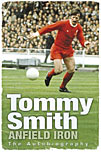 The Autobiography
The Autobiography
by Tommy Smith
Bantam Press, £18.99
Reviewed by David Stubbs
From WSC 256 June 2008
“Anfield Iron” (no sniggering, London readers) is the nickname conferred on the former Liverpool captain who improbably crowned a faltering career in the 1977 European Cup final when he quick-wittedly attached his head to Steve Heighway’s blasted corner and scored the Reds’ second goal. However, although acknowledging his hardness and his willingness to intimidate young wingers by threatening to break their legs, Smith protests that he is a fair player. He was, he says, only cautioned twice in his career (although this has increased to three times by page 394). He was famously suspended for feigning an injury in a Cup-Winners Cup tie against Ferencvaros. However, Smith protests, he was only pretending to go down from a bottle hurled from the crowd having been struck by one minutes earlier, unnoticed. So all was fair, really.
But there’s another tackle that Smith shirks altogether. Nowhere in this memoir does he allude to the appalling comments Dave Hill attributes to him regarding the suitability of black people as neighbours in his book on John Barnes, Out Of His Skin. Indeed, Albert Johanneson apart, whom Smith incongruously takes time to praise as a “smashing lad”, black people are absent from this otherwise colourful account altogether.
Smith does proudly dub himself a “patriot”, but Liverpool is his first love and one has to wade through a little of the sentimental self-satisfaction in which hardcore Scousers sometimes collectively wreathe themselves – talk of the “Liverpool way”, as if they have a monopoly on good-heartedness, or speaking constantly of Liverpool Football Club, as if they are somehow more fully a Football Club than other Football Clubs.
Get past all this, the occasional bit of after-dinner waggery (Hitler surrendering when he heard that Smith had been born in 1945 etcetera) and every anecdote having “How often do you see that nowadays?” appended and there is much to enjoy in this voluminous tome. The ghostwriting of Les Scott juts amusingly out occasionally – the correct use of “personae non gratae” to convey the Latin plural is one example. But he does a tidy job overall in helping Smith track Liverpool’s imperial rise under the aegis of Bill Shankly, peppered with flavoursome anecdotes.
The diminutive Shanks dominates this text like a colossus, as he did the club. Smith shrewdly observes that Shankly was, paradoxically, a traditionalist who eagerly embraced new ideas, especially on diet and warming down. He was also a wily twister of opponents’ minds – having staff hand out toilet rolls to away-team players as they arrived at the ground – as well as geeing up his own players psychologically, going so far as to create a fake “Cup final” brochure, supposedly produced by Chelsea, on the eve of their 1965 semi-final with Liverpool.
Smith continues his feud with the late Emlyn Hughes, who supplanted him as captain, suggesting Hughes talked of Arsenal players being willing to throw a key fixture for £50 a man. He excites sympathy when he recounts how a DHSS jobsworth had him shopped for taking part in a staged penalty shootout in 1996, but he persists in implying that the bureaucrat, now dead, was an Evertonian, despite the many denials.
His prescriptions to curtail the excesses of the modern game are a mixture, oddly, of WSC-type idealism with regards to the corporatisation of the game and old-school silliness – he feels today’s players should eat more puddings, like he did. All highly readable, but decide for yourself whether you would want Tommy Smith for a neighbour.